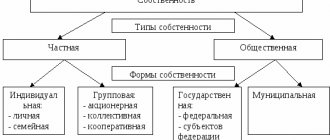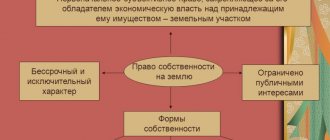Property is a historically determined form of appropriation of material goods by people. With a more thorough analysis of its content, its economic and legal aspects come to the fore. They are closely interconnected and interdependent.
A form of ownership is a type that is characterized by the subject and the peculiarities of its connection with the object.
The interaction itself directly depends on the type of socio-economic system. Each object and subject, in turn, corresponds to special forms. The criteria are quite diverse and can be classified according to many criteria: property rights, methods of appropriation, etc. Let us consider further what the form of ownership may be.
Concept of property and property rights
What is property ? This is the ownership of things by certain persons, as well as the relationships that arise in connection with the ownership of property. That is, property is both a legal and an economic category.
Legal ownership is the right to own things. Consists of the right to own, use and dispose of one’s property.
Property as a civil law institution is a set of legal norms that are aimed at regulating economic property relations using civil law methods.
Property in economics is social relations within the framework of ownership, division and redistribution of property objects. What is important is the actual relationship - who really controls the property and makes decisions about its use, disposes of it, and not the formal right according to documents.
The economic content of property is revealed through ownership, management and control.
Property is a basic economic institution that has existed since people first had things and such concepts as “mine” and “someone else’s.”
We have learned the basic definitions of property, now let's move on to its types.
What are the forms of public ownership?
On the territory of the Russian Federation there are three main forms of public property, namely:
- state;
- municipal;
- collective.
Each form is divided into several subspecies. Public property, which is in the hands of a municipality or the state, differs from private property in that it does not prioritize profit. The main tasks are:
- popular interests;
- solving social problems;
- providing people with basic services.
The object of public property is not only real estate, but also natural heritage, architectural monuments and many other national values.
Forms of ownership in the economy
A modern market economy is an economy with mixed ownership. Therefore, the law recognizes various types of property, including mixed ones.
Forms of ownership are discussed in detail in high school social studies classes. We will consider only the main classifications.
Forms of ownership in the Russian Federation are divided into the following types:
- State federal - natural resources included in economic circulation, means of production, information, that is, everything that is under the jurisdiction and disposal of the state and under its responsibility.
- State regional - all the same, transferred to the subjects of the Federation.
- Municipal property, which is under the jurisdiction of local governments.
- Private - property of citizens and legal entities.
- Property of public organizations.
From the point of view of legal regulation, property can be divided into the following groups:
- Real estate - land, buildings, structures, infrastructure.
- Movable property is something that can be moved: machinery, equipment, tools.
- Intellectual property is a product of human mental activity: scientific works, manuscripts, inventions, discoveries, achievements in art and literature.
Classification of forms of ownership by legal regime:
- Based on the subjects (owners) of property - individual citizens, groups, legal entities, the state.
- According to the form of appropriation - individual, collective and state property.
- According to the composition of subjects (owners) - individual, group, public.
Types of property based on numerical characteristics:
- Private property is something that belongs to one person.
- Collective property is something that belongs to a group of people, and each of them has some part in this property.
- Public property is something that belongs to everyone.
Prepare for the Unified State Exam in Social Studies with courses from Skysmart - fun and effective!
Types of private property
Private property can take the following main forms:
- Single property - characterized by the fact that physical. or legal A person realizes all property relations. The owner of a private enterprise can use the labor of his family or hired workers;
- Partnership ownership - it offers the association in one form or another of property, capital, several legal entities or individuals for the purpose of carrying out common business activities;
- By type of desk. own We have an LLC (limited liability company) and an ALC (additional liability company).
- Corporate ownership is based on the function of capital, which is formed through the free sale of titles to one’s own shares in an OJSC (open joint stock company).
Grounds for property rights
Property rights are a set of legal norms that secure the assignment of things to individuals and groups.
In Russia, the grounds for acquiring property rights can be divided into primary and derivative.
Ownership arises:
- as a result of making a thing on your own from your own or ownerless materials;
- as a result of the use of property, for example, ownership of rental income or fruits grown on one’s own plot;
- as a result of the acquisition of property under a purchase and sale transaction, exchange, donation, privatization;
- as a result of receiving an inheritance;
- by the right of the first to find an ownerless thing, for example, a treasure;
- by right of prescription - 15 years for real estate and 5 years for other property.
Grounds for termination of ownership: refusal of the owner of the right of ownership, loss or destruction of property.
A person can be forcibly deprived of property rights by court - to pay off obligations, during confiscation, seizure, forced redemption.
According to the laws of the Russian Federation, the right of ownership includes three components: the right to own, use and dispose of a thing. Let's learn more about the essence of property rights.
How can you purchase private housing?
A person has many options for obtaining home ownership. The most common is to purchase an apartment from the developer or the owner. The following methods can also be distinguished:
- Privatization of municipal housing. If a person lives in a municipal apartment that was received before 2005, then he has the opportunity to privatize it.
- Inheriting housing.
- Participation in housing cooperatives and kindergartens.
Purchasing individual housing
People most often purchase an apartment through participation in a shared participation agreement or through a regular purchase and sale agreement.
Types depending on the number of owners
Important! Forms of ownership can also be classified depending on the number of entities that own the car.
Usually, particular and general forms are considered.
Private
This type assumes that the vehicle has only one owner. He has the right to dispose of, own, and use his car.
General
The right of common ownership of a car appears in the case when the car belongs to two or more persons (Article 244 of the Civil Code of the Russian Federation). Moreover, all subjects together have the right to own a vehicle, but theoretically, each person’s share in it can be distinguished.
Restrictions on the right arising from the presence of several owners are mainly associated with the need to provide the opportunity for pre-emptive purchase to the co-owners of the car.
Property that belongs simultaneously to several entities is called common property if it cannot be divided in such a way as to preserve its original purpose, or it is prohibited by law from being divided.
Possession of the right of ownership of an indivisible thing can be either joint or with a determination of the ratio of the rights of all subjects to dispose of it. Consequently, ownership of a car as a thing not subject to division can be of the following types:
- Share. This type involves determining the shares of each of the subjects. For example, if a car is inherited by three heirs, then the share of each of them will be 1/3 of the right to the vehicle.
- Joint. This type of ownership is possible if the law does not provide for the allocation of shares. For example, property of spouses acquired during marriage.
Features of entrepreneurship
Entrepreneurship is a special activity implemented in different fields, and each entrepreneur chooses an industry that is understandable and close to him. The most popular areas include:
- industrial;
- scientific;
- service
Important! Entrepreneurship involves the formation of a specific business focused on the provision of services, the production of goods or their sale. Different types of business contribute to the development of the economy and the country as a whole.
Therefore, the state supports businessmen, since organizations engaged in entrepreneurial activities pay significant taxes to the budget. Entrepreneurship is considered a risky activity.
Thus, there are many types and forms of ownership, each with its own unique differences. Each person or organization can become the owner of various objects, for which title documents are drawn up. Due to their presence, property is protected from fraudulent activities by third parties.
Legislation of the Russian Federation
The main legislative documents establishing the features and classification of various forms of governance are the Constitution and the Civil Code of the Russian Federation.
In accordance with the law, the main task of identifying forms of ownership is to determine the legal regime of property and the opportunities that the owner has in relation to values.
Paragraph 2 of Article 8 of the Constitution of the Russian Federation recognizes various types of property management and ways to protect the rights of citizens. A similar division is carried out by Article 212 of the Civil Code of the Russian Federation, which adds smaller categories of values.
State
State property is property that is owned by the Russian Federation. Moreover, all the results of labor obtained within the framework of federal property can be used exclusively by the state.
The role of state property in the country's economy:
- a similar form is necessary in those industries where there is no place for private business: energy supply or railway transport,
- production of public goods: the defense capability of the state, the operation of the road network, etc.
- carrying out the nationalization of enterprises in order to rebuild the economy,
- organization of a single economic space.
A distinctive feature of state ownership is that it loses to private ownership in terms of economic efficiency due to less interested control.
State property can be created in several ways:
- construction of facilities at the expense of federal budgets,
- purchase by the state of controlling stakes in the enterprise,
- nationalization of unprofitable but socially useful companies.
Property may also become government property if the property is seized by federal law enforcement agencies.
Joint ownership
The concept of “joint property” is regulated by Articles 33-34 of the Family Code and paragraph 1 of Article 256 of the Civil Code of the Russian Federation.
Confirmation
Joint property appears when citizens enter into official relations, therefore the marriage document confirms the emergence of the right to common values.
General package of documents that can confirm the rights to ownership of property:
- passport with a note indicating the presence of an official partner,
- registration certificate,
- if there is: marriage contract,
- children's birth certificates.
Selling Features
The main feature of joint property is that it is not divided into shares and belongs entirely to the partners. For this reason, the sale of such property is impossible without the notarized consent of the second spouse.
Otherwise, the alienation of joint assets is completely similar to the process of a standard sale under a contract. The transfer of rights is formalized through Rosreestr, and the state duty for making adjustments to the Unified State Register is 350 rubles.
You may also be interested in: How to check online the readiness of a document in Rosreestr
Share in an apartment
Shared ownership is ownership of property that is divided into shares, usually depending on the personal contribution of the citizen. This type of value management is emerging for three reasons.
Formation of shared values:
- the property was inherited by several citizens,
- the property was purchased or accepted as a gift by two or more people,
- values are divided between spouses (for example, during divorce).
The percentage of shares is indicated in the document that confirms the rights to dispose of the object.
Tax deduction
The distribution of tax deductions between spouses is established by law. So, if more than 4 million rubles were spent on an apartment, then each partner can receive a maximum deduction of 2 million rubles.
If expenses are less than 4 million rubles, then the share will be distributed in accordance with the wishes of the spouses. For example, 30/50 or 50/50. The size of the deduction will not depend on who the apartment is registered to or who spent more money on its purchase.
Private
The Civil Code and the Constitution of the Russian Federation establish the concept of “inviolability of private property,” which protects the owners of such property from the illegal seizure of their valuables by other people.
Depending on the form of management, it is customary to distinguish two types of private property:
- individual,
- public
Moreover, each type has subcategories, which also have their own legal characteristics and legal justification. They are described in detail by the Civil Code of the Russian Federation.
The individual form of private property is divided into:
- form of unity - all benefits are owned by a single citizen who can attract hired workers,
- partnership - an association of individuals to conduct business activities,
- cooperative - individuals form capital through the sale of free shares.
Public is divided into:
- collective form, in which management rights are shared among workers,
- state - the property belongs to the city or town,
- national - values that belong to all residents of the state (museums, memorial places, etc.),
- combined - formed when different forms of property are combined.
Joint and shared ownership play an important role in the life of an ordinary citizen, because each person is in one way or another involved in this form of property management.
Video: Concept and content of property rights
Joint
Joint property is property that simultaneously belongs to two or more citizens. At the same time, the values are not divided between individuals, that is, the partners own them on an equal basis. This happens between spouses after marriage. For example, an apartment purchased during marriage will not be divided into shares, but is considered common.
This point does not apply to values acquired before the conclusion of a legal union. That is, real estate purchased before marriage will not become common after signing the documents.
The legal characteristics characteristic of joint property are described in the Civil Code of the Russian Federation.
Share
Shared ownership is property owned by two or more persons, which is divided into shares depending on the investments made or the territory purchased. With this form of ownership, the division of values can occur regardless of whether the citizens are relatives.
In order for ownership to be legal, the shares must be officially registered. After this procedure, the participant acquires the right to real estate.
You may be interested in: Sell real estate on Avito for free.
What documents confirm the right to real estate
When purchasing real estate, each person receives the appropriate papers. Documents are divided into:
- technical;
- establishing rights.
Until 2021, it was necessary to obtain a certificate of title to confirm ownership of the property.
Documents evidencing the right of ownership of housing
This could be done only after receiving a technical passport (issued by BTI employees after assessing the housing) and one of the title documents (purchase agreement, etc.).
Individual cases
According to the comments to the Constitution of the Russian Federation, individual cases of forms of ownership mean various public associations, for example, trade unions or political parties. They cannot be considered a private species, although officially they are legal entities, but it is also impossible to recognize them as a public organization.
Features of types of property for business in Russia:
Organizations
Due to gaps in the legislation, there are a number of organizations that are quite difficult to classify as one of the forms of property. This is due to the features of the structure and the functions performed.
"Special" organizations:
- unions,
- political parties,
- religious organizations.
Many experts believe that such companies belong to public property, but this cannot be legally confirmed.
Enterprises
For enterprises, the legislation distinguishes other forms of ownership, based on the characteristics of the organizational structure or on the shares of invested capital.
Other forms of property characteristic of the enterprise:
- mixed property - property based on a combination of different types of ownership,
- foreign - valuables owned by foreign persons,
- intellectual - the objects are the results of mental activity.
The rights of the last category of property are protected by special laws: on copyright and related rights, legal protection of programs for electronic computers, etc.
Real estate and residential premises
For residential and non-residential real estate, there is only one “other” form of property - general, which is divided into two categories depending on the management style.
Categories of general values:
- Joint - occurs between legal spouses. In this case, the real estate is not divided into shares, but belongs to the partners simultaneously.
- Shared - the property will be divided into equal shares. In this case, ownership and disposal of property occurs by consent of the owners.
A striking example of the second form is an apartment purchased under an equity participation agreement. A residential building is represented by private property - apartments, which are shares, and common property in the form of entrances, elevators and basements.










